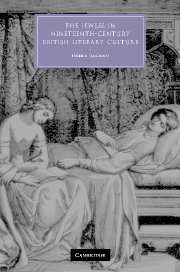Book contents
- Frontmatter
- Contents
- List of illustrations
- Acknowledgments
- 1 Introduction: the Jewess question
- 2 Repellent beauty: the liberal nation and the Jewess
- 3 Jewish persuasions: gender and the culture of conversion
- 4 Women of Israel: femininity, politics and Anglo-Jewish fiction
- 5 Hellenist heroines: commerce, culture and the Jewess
- 6 The shadow of the harem: fin-de-siècle racial romance
- 7 Conclusion: neither wild thing nor tame
- Notes
- Bibliography
- Index
- CAMBRIDGE STUDIES IN NINETEENTH-CENTURY LITERATURE AND CULTURE
4 - Women of Israel: femininity, politics and Anglo-Jewish fiction
Published online by Cambridge University Press: 10 December 2009
- Frontmatter
- Contents
- List of illustrations
- Acknowledgments
- 1 Introduction: the Jewess question
- 2 Repellent beauty: the liberal nation and the Jewess
- 3 Jewish persuasions: gender and the culture of conversion
- 4 Women of Israel: femininity, politics and Anglo-Jewish fiction
- 5 Hellenist heroines: commerce, culture and the Jewess
- 6 The shadow of the harem: fin-de-siècle racial romance
- 7 Conclusion: neither wild thing nor tame
- Notes
- Bibliography
- Index
- CAMBRIDGE STUDIES IN NINETEENTH-CENTURY LITERATURE AND CULTURE
Summary
Conversionist writing provided the cultural challenge and literary models for the first Anglo-Jewish novels. If Jews in early Victorian England did not succumb to the seductions of Evangelical prose, they were nevertheless roused to passionate literary disputation. They met the Evangelical novel on its own terms, in fictional genres directed to women readers and focused on female characters. In a climate in which religion was closely entwined with ideology and politics, moreover, the literary vindication of Judaism was inevitably a political intervention. In the work of early Victorian Anglo-Jewish writers, the subject of this chapter, the Jewess was the site of these discursive battles.
One example of a terrain particularly contested between Christian and Jewish women in the 1830s and 40s was the common property of the Old Testament. In The Women of Scripture (1847), for example, the Evangelical writer, feminist and temperance campaigner Clara Lucas Balfour used a series of portraits of biblical women to confirm the superior status of the female under modern Protestant Christianity. Her text begins, however, with a comparison of the treatment of women by Christianity and Islam. The life of Muslim women, she laments, is ‘one of monotony, indolence, ignorance and consequent debasement and sorrow’; they are ‘victims of man's caprice’, condemned to an endless repetition of ‘bathing, dressing, embroidery, and passive obedience … uncheered by any assured hope of a compensating futurity’.
- Type
- Chapter
- Information
- The Jewess in Nineteenth-Century British Literary Culture , pp. 85 - 129Publisher: Cambridge University PressPrint publication year: 2007



